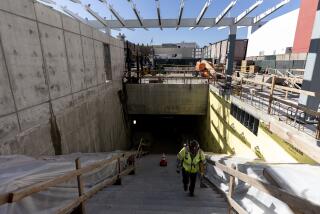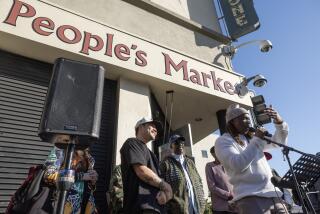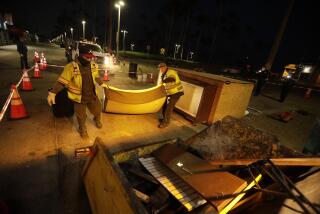Job Training Center Planned by Toyota and Urban League : Rebuilding: Effort in riot-torn area will train 100 people a year as auto mechanics. Opening is set as early as next spring.
Toyota’s American sales group and the Los Angeles Urban League on Tuesday announced plans to build a vocational center that each year will train 100 residents of Los Angeles’ riot-torn neighborhoods to be auto repair technicians.
Torrance-based Toyota Motor Sales will spend $3 million to construct, equip and operate the training center at an undetermined site. Over a three-year period, the Urban League gradually will assume control of the center.
The project--aimed primarily at unemployed and underemployed minorities and carrying the promise of job placement at local auto repair shops--won praise Tuesday from Rebuild L.A. co-chairman Peter V. Ueberroth and Los Angeles Mayor Tom Bradley as a model partnership between corporate and community interests.
Ueberroth and Bradley said they hope Toyota’s commitment of cash and technical support will influence other corporations.
Bradley said Toyota was setting a “needed example” to “the many corporations who have been prodded, and who will be prodded . . . to rebuild the spirit as well as the physical facilities of Los Angeles.”
Ueberroth called the announcement one of the most important post-riot programs to date.
“You can be sure every Japanese company and every (other) Asian-based company is going to watch this . . . in a very thoughtful way,” he said. “There will be many more to join the line.”
On the six-month anniversary of the riots two weeks ago, Ueberroth said that more than 500 companies from the United States, Europe and Japan were developing plans to invest more than $1 billion in inner-city Los Angeles communities over the next several years. However, no master plan and few details have emerged.
Toyota becomes the second Asian auto company to offer post-riot aid.
Two months after the riots, Hyundai Motor America, the U.S. arm of the Korean auto maker, announced a program to train South Los Angeles high school graduates as mechanics and to employ them in local dealerships. Hyundai’s first group of 15 students is in the midst of an 18-week training program.
Another Japanese company, Pioneer Electronics, this fall began a job-training program for high school students in Watts. It offers a two-year electronics repair course to 30 high school juniors, with the promise of entry-level electronics technician jobs upon graduation.
Toyota made its announcement Tuesday at the company’s technician training center in Torrance, where experienced repair technicians are trained to work at Toyota dealerships.
The company’s general counsel, Doug West, said Toyota considers its donation of manpower more significant than its monetary contribution. Toyota will assign 13 trainers to work full time at the new vocational center for the first two years of its operation.
“We are not doing any of this out of altruism,” West said. “Los Angeles is our largest single market and our home.”
The plan calls for the new center to open as early as next spring. Students will be placed in part-time auto-service jobs to supplement their study at the center. Graduates will be placed at auto repair businesses with the assistance of Toyota.
The Urban League will recruit and screen potential students. Urban League President John Mack said educational prerequisites will be flexible. “The important thing is that they know how to read a manual,” he said.
Mack said he hopes the auto training center will become a stable source of trained workers, similar to a computer data processing school that the Urban League has run for two decades in South Los Angeles.
One of the data processing school’s graduates, Al Maxwell, is now a management staff member in Toyota’s corporate information systems office, Mack said.
One hundred jobs a year, Mack acknowledged, will not make a dent in the inner-city job crisis.
“It’s not a spectator sport we’re about here--we need other corporations to do the same,” he said. “If we multiply 100 jobs enough times, we’ll be able to make a difference.”






